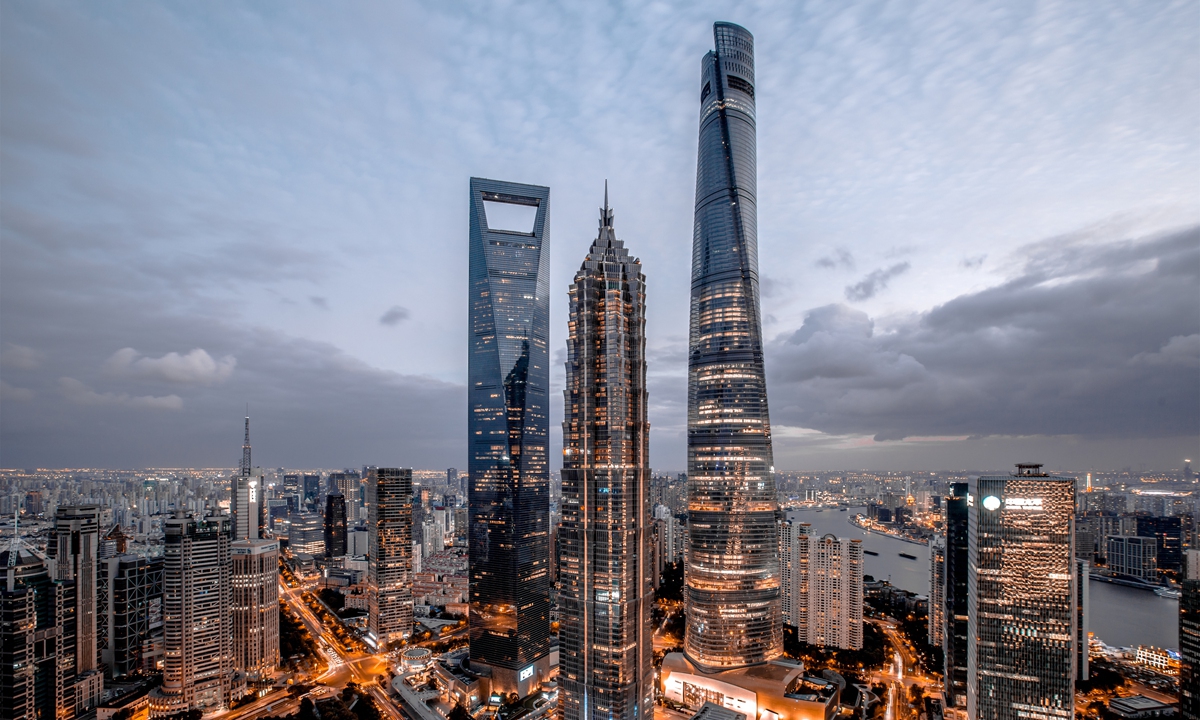
Lujiazui, a financial zone in Shanghai Photo: VCG
The Economist said in a recent article that China's rapid rise is slowing down. In response to the recent hype across some Western media outlets over whether China's rise is about to peak, what we would like to say is that the country's high-quality economic development is sustainable. Any doubts about this will make skeptics miss out on the opportunities presented in China's huge market.
In recent decades, Western predictions of a so-called China collapse have been accompanied by China's rise, which not only reflects the West's lack of understanding on the Chinese economy, but also mirrors the West's emotional resistance against China's emergence as an economic power. The theory of "China's rise is about to peak" is nothing but a new variation of the tired "China collapse" cliché, which appears from time to time, but has never turned into reality.
It is interesting to see the Economist publish an article in April praising the US economy before it joined the discussion of whether China's rise is about to peak. The Economist said the US remains the world's richest, most productive and most innovative big economy. "Anxiety obscures a stunning success story - one of enduring but underappreciated outperformance," the article said.
"That idea is making waves in Washington. Particularly among those who feel the deep divisions in this country, are disheartened by the prospects of a rerun of the 2020 election between an octogenarian and an indicted former president, and see the looming specter of stalemate over raising the debt ceiling that could force the nation to default, the notion that the U.S. economy is world-beating is a welcome reassurance," Harvard University' Graham Allison said in a recent commentary responding to the Economist article.
According to Allison, the Economist reaches its conclusion by excluding China and instead, it compares the US with competitors in the G7 to declare the US economy the winner. However, the fact is that G7 economies' combined share of global GDP has been shrinking in recent decades. US' economic leadership among G7 economies is not something worth bragging about, as the share of developing countries in the world economy has significantly increased.
With this as a backdrop, it comes as no surprise that there is a discussion about whether China's rise is about to peak. The theory represents not fact but some Western elites' expectations for China. They look for spiritual comfort from the alleged bleak prospects for China's economy, but spiritual opium cannot help them solve practical problems. It reflects nothing but American elites' lack of confidence in dealing with current economic challenges.
Although some elites in Western countries have recently come up with rhetoric that "China's economy has peaked," facts showed the Chinese economy has started off the year with 4.5 percent year-on-year growth in the first quarter, laying a solid foundation for the full-year economic rebound in 2023 and injecting more confidence into the global economy amid a volatile international environment. China is an exception to the slowdown that the global economy is expected to experience this year, World Bank Group President David Malpass said in early April.
The performance of the Chinese economy in the first quarter has boosted the confidence of foreign investors in the Chinese market. China's inflow of foreign direct investment (FDI) grew 4.9 percent year-on-year to $59.2 billion in the first quarter. Investment from France and Germany surged by 635.5 percent and 60.8 percent year on year, while investment from Japan, Canada, Switzerland, South Korea, and the UK also recorded significant growth, according to data from China's Ministry of Commerce.
In stark contrast to the skeptics' pessimistic tones, business leaders in Western countries have expressed their optimistic expectations on the prospects of the Chinese economy. Despite the US-led "decoupling" push, a slew of foreign CEOs - included Intel's Patrick Gelsinger and Apple's Tim Cook - made a succession of visits to the Chinese market from March to April. During the visits, many of those executives expressed their companies' long-term commitment to the promising market.
The strong attractiveness of the Chinese market to foreign companies is not a surprise. As China's economy continues to upgrade and optimize, its huge consumer market is encouraged to play a more important role in economic growth. China's consumption upgrade and quality development will bring more space for foreign companies to boost sustainable growth. More importantly, China has unswervingly continued to expand opening-up, constantly improving the investment environment and providing operating facilitations for foreign companies.




